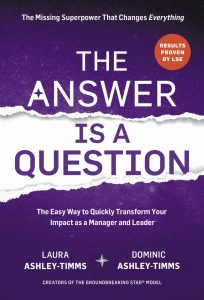By Dominic and Laura Ashley-Timms, above, co-authors of The Answer Is A Question
As businesses began to emerge from the battering they suffered at the hands of the pandemic, they faced a new headwind presented by the changed expectations of a workforce that had fundamentally shifted its values.
Recognising that life is short, those of an age and means chose to exit the workforce entirely whilst many others resolved to resign from less than satisfactory jobs or from companies offering little prospect of development or advancement. Many others resolved to quietly quit, choosing to limit their contribution to their employer.
Looked at through this lens, many employers might despair at their tragic retention figures. Whilst they may have hastily adjusted benefits and salaries, wrung their hands as they caved in to their employees’ desire to work from home (turning once vibrant workplaces into ghost towns) little has really changed with regard to the structures and strictures that most organisations still operate within; senior leaders define the organisational strategy, middle managers translate that into work for teams and employees to conduct and then solve the problems that occur to keep the show on the road. And ever has it been since 1911 when Frederick Winslow Taylor first laid down his Principles of Scientific Management.
Yet these most recent traumas have surfaced a deeper malaise which is underpinning the UK’s desperately poor productivity levels when compared to their G7 competitors. In 2019, the government called for evidence as to how UK productivity might be improved. The Confederation of British Industry (CBI) responded by launching their Great Job report into the state of British management, noting that for only a 7% increase in the quality of management, the UK economy could benefit from unlocking an additional £110bn.
In an effort to find the levers that might be pulled to lift our flagging performance, the government launched a research fund administered by Innovate UK to put good ideas to the test and research proposals were invited. One of those that offered potential came from a company called Notion which had defined a new approach to managing others that utilised an enquiry-led approach, dubbed Operational Coaching™. Their work with a variety of larger corporates had focused on adapting management behaviours to capitalise on the insights and learning of team members, recognising that as managers we often rely on recycling our former (potentially outmoded) knowledge and that telling, directing, fixing and solving problems tended to disenfranchise employees, robbing them of an opportunity to learn and to gain future appreciative feedback. Notion was one of six proposals to win funding from 189 proposals received, and the only one to offer a potential advancement in the practice of management itself.
The subsequent trial of their STAR® Manager programme covered 62 organisations in 14 sectors, one of the largest randomised control trials of its kind, and the protocols were designed, administered and the results from the trial were independently evaluated by the London School of Economics and Political Sciences (LSE).
And what were the findings? LSE established, statistically significantly that managers undertaking the programme learned to adopt new behaviours which led to a 70% increase in the time that they spent using a coaching style of management with others. Unsurprisingly, LSE also detected positive trends (a sixfold improvement) in the levels of employee retention in the intervention group versus those in the control group.
Ask yourself this question: “With the changes that have happened and the new paradigm we seem to be operating in, how have we equipped our managers any differently with the skills they need to cope?” The time for a management revolution is now.
 Dominic and Laura Ashley-Timms are the co-creators of the STAR® Manager programme, co-founders of performance improvement consultancy Notion, and co-authors of The Answer Is A Question. The book has been shortlisted for a Business Book Award 2023
Dominic and Laura Ashley-Timms are the co-creators of the STAR® Manager programme, co-founders of performance improvement consultancy Notion, and co-authors of The Answer Is A Question. The book has been shortlisted for a Business Book Award 2023


